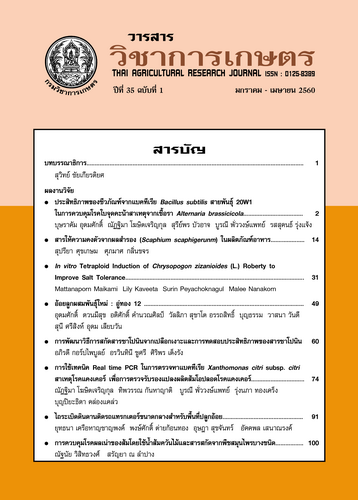ประสิทธิภาพของชีวภัณฑ์จากแบคทีเรีย Bacillus subtilis สายพันธุ์ 20W1 ในการควบคุมโรคใบจุดคะน้าสาเหตุจากเชื้อรา Alternaria brassicicola
DOI:
https://doi.org/10.14456/thaidoa-agres.2017.19คำสำคัญ:
โรคใบจุดคะน้า, (Bacillius subtills), Alternaria brassicicola, จุลินทรีย์ปฏิปักษ์ ชีวภัณฑ์บทคัดย่อ
โรคใบจุดคะน้า เกิดจากเชื้อรา Alternaria brassicicola เป็นโรคที่มีความสำคัญ ทำความเสียหายกับคะน้าทุกระยะการเจริญเติบโต การควบคุมโดยชีววิธีเป็นทางเลือกหนึ่งที่ลดการใช้สารเคมี ดำเนินการคัดเลือกแบคทีเรีย Bacillus subtilis สายพันธุ์ใหม่ที่มีศักยภาพในการควบคุมโรคใบจุดคะน้า ระหว่างเดือนตุลาคม ปี พ.ศ.2554 - กันยายน ปี พ.ศ. 2556 โดยคัดเลือกในระดับห้องปฏิบัติการ ด้วยวิธี dual culture technique จาก Bacillus spp. จำนวน 135 ไอโซเลท ซึ่งแยกจากดินปลูก ปุ๋ยคอก และวัสดุปลูกจากแหล่งต่าง ๆ พบว่า ไอโซเลท 20W1 20W5 20W4 20W12 และ 17G18 มีศักยภาพสูงสุด ในการควบคุมเชื้อ A.brassicicola นำทั้ง 5 ไอโซเลท ไปทดสอบการควบคุมโรคเบื้องต้นในโรงเรือนโดยพ่น cell suspension ของ Bacillus spp. ก่อนปลูกเชื้อ A. brassicicola พบว่า ทุกไอโซเลทสามารถลดการเกิดโรคได้ โดยมีความรุนแรงของโรคเท่ากับ 46.77% 52.81% 59.99% 60.45% และ71.31% ตามลำดับ เปรียบเทียบกับชุดควบคุมที่มีความรุนแรงของโรค 73.79% จากนั้นนำทั้ง5 ไอโซเลทไปทดสอบในแปลงปลูกที่ อ.ท่ามะกา จ.กาญจนบุรี โดยวิธีการพ่นด้วย cell suspension เช่นกัน พบว่า ทุกไอโซเลท มีค่าเฉลี่ยเปอร์เซ็นต์ความรุนแรงของโรคต่ำกว่ากรรมวิธีที่ไม่มีการพ่นอย่างมีนัยสำคัญทางสถิติ จากนั้นได้นำแบคทีเรียทั้ง 5 ไอโซเลท มาพัฒนาเป็นชีวภัณฑ์สูตรผง และนำไปทดสอบในแปลงปลูกเดิม พบว่ากรรมวิธีที่พ่นด้วยชีวภัณฑ์ B. subtilis ไอโซเลท 20W1 มีประสิทธิภาพสูงสุดในการควบคุมโรคใบจุดสามารถลดการเกิดโรคได้เท่ากับ 32.88% การใช้ชีวภัณฑ์ B. subtilis ไอโซเลท 20W1 อัตรา 20-30 ก./น้ำ 20 ล. ให้ผลดีเทียบเท่ากับการพ่นด้วยสาร mancozeb 80% WP (40 ก./น้ำ 20 ล.) และอัตรา 40-50 ก./น้ำ 20 ล. ให้ผลดีกว่าการพ่นด้วยสาร mancozeb 80% WP อย่างมีนัยสำคัญ ดังนั้น B. subtilisไอโซเลท 20W1 จึงเป็นสายพันธุ์ใหม่ที่มีศักยภาพ สามารถนำไปพัฒนาเป็นชีวภัณฑ์เชิงพาณิชย์ใช้ควบคุมโรคใบจุดคะน้าในระดับแปลงเกษตรกรได้
ดาวน์โหลด
เผยแพร่แล้ว
รูปแบบการอ้างอิง
ฉบับ
ประเภทบทความ
สัญญาอนุญาต
ลิขสิทธิ์ (c) 2017 วารสารวิชาการเกษตร (Thai Agricultural Research Journal)

อนุญาตภายใต้เงื่อนไข Creative Commons Attribution-NonCommercial-NoDerivatives 4.0 International License.
วารสารวิชาการเกษตร



